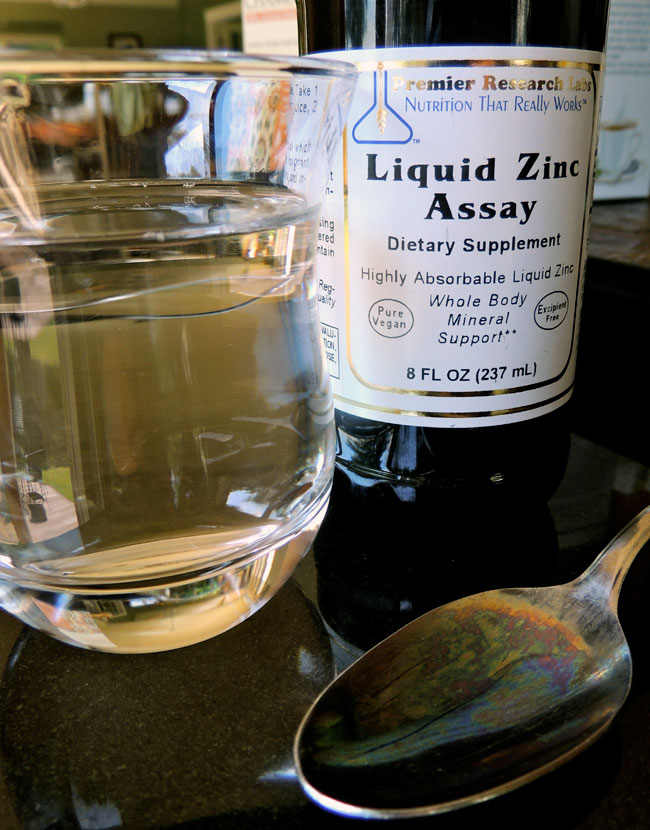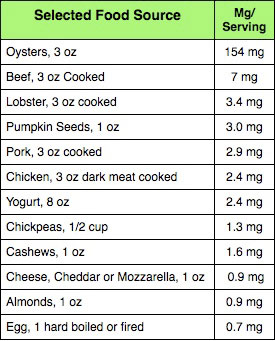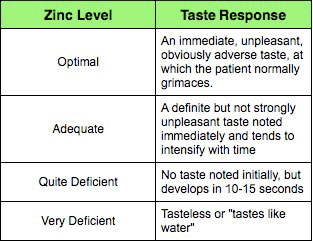Has anyone ever off-handedly recommended that you take zinc? Most frequently zinc is remembered as an ingredient mixed into glossy, fruit-flavored lozenges to help prevent a pending attack of the common cold, or as packed into synthetic multi-vitamin concoctions for “muscle-bulking.” It is a supplement that seems to be tossed about frequently in conversation with a reputation for general “helpfulness,” but with little clarity regarding its actual importance. However, the mysterious zinc is in fact a very powerful mineral that has wide-ranging functions in the fundamental biochemistry of the body. It is integral for proper cellular metabolism and contributes to the makeup of more than 300 enzymes in the human body. Zinc is also involved in complex life-sustaining reactions such as the immune response, protein synthesis, and cell division. It is therefore crucial for growth and development, wound healing, energy level maintenance, and mood regulation, among other things. Thus, despite the common dogma that zinc should only be consumed when about to get sick or after a good workout, this mineral is actually needed in our everyday activities and is certainly not one to be ignored. That is why it is important to check if you are zinc deficient. Learn more about zinc deficiency symptoms and how to test yourself at home with this guide.

Food Sources of Zinc
Zinc is an essential nutrient, meaning that it is not organically manufactured within the body and therefore needs to be consumed in the form of food or supplemental sources. The recommended daily intake of zinc is between 10-20 mg per day, though this is variable depending on age and health condition. This may seem like a modest amount, however given the mineral-deficient state of modern food sources and rampant problems with gastrointestinal function in the United States, you may be surprised at just how difficult accumulating this small quantity can be. Zinc is most commonly found in seafood, but is also present in eggs, certain meats, and nuts. Some breakfast cereals and processed grains will also claim to be fortified with 25% of the daily value of zinc in a serving. This is a somewhat comical assertion however, as commercial cereals are rich in phytates (the very irritating substance found in unsoaked/sprouted grains and nuts), which significantly reduce the absorption of zinc, and can even contribute to zinc deficiency. Therefore, those individuals who are vegetarians or who consume a low animal product, highly-refined carbohydrate diet are at a particular risk for zinc deficiency regardless of food fortification. The bioavailability of zinc from plant sources can be increased by personally preparing foods using the techniques of soaking, sprouting and fermenting grains and seeds, however supplementation may still be required for adequate maintenance levels. Nourishing Traditions is a valuable resource for learning more about these food preparation techniques.

Zinc Deficiency
While overt zinc deficiency is believed to be uncommon in North America, there is a significant risk for zinc inadequacy. Individuals with increased risk for insufficient levels of zinc include those experiencing gastrointestinal disorders, malignancies or other chronic illnesses, alcoholics, vegetarians, and pregnant or lactating women. Such circumstances cause biochemical changes in the body which result in poor absorption, expedited losses or increased zinc requirement. Zinc also competes for absorption with copper, iron, calcium and magnesium within the body. Because these minerals work in very specific ratios, over-supplementation with other isolated minerals (in the form of tablets or food fortification) can also significantly block the absorption of zinc. This has become a notable problem with iron, as large-dose supplementation and fortification has become a popular treatment effecting millions of people with iron-deficiency anemia. Finding a balanced whole foods source of iron, or taking supplemental iron between meals, are helpful ways of reassuring zinc availability remains adequate as well. Because of zinc’s diverse roles in the body, symptoms of deficiency can be somewhat non-specific and generalized, thus making it easily confused with other signs of illness or nutrient inadequacy. However, if you are currently being treated for any of the following symptoms, zinc may be an appropriate adjunct therapy to discuss with your provider.
- Delayed wound healing
- Taste & smell disorders
- Impaired growth & sexual development
- Hyperactivity
- Impaired Adrenal Function (including stress, anxiety)
- Skin disorders
- Irritable Bowel Syndrome
- Vision Degeneration
- Iron non-responsive anemia
- Pica (eating dirt)
- Eating disorders (such as anorexia, bulimia)
The Zinc Assay Taste Test
Zinc supplies are tightly controlled and distributed throughout the body for protein and nucleic acid compositions. There is no specific system for zinc storage in the human body, and it is thus regulated tightly by homeostatic mechanisms which keep about 98% of the body's supply within the cells at any given time. This system makes zinc levels very difficult to measure using overt laboratory methods. Plasma and serum tests for zinc levels are the most common means of evaluation, however, they pose significant difficulties because they are not indicative of cellular zinc. There is a simple at-home zinc deficiency taste test, first reported in The Lancet medical journal, that can help determine physiological zinc levels. This zinc deficiency test uses Premier Research Labs Liquid Zinc Assay, an easily absorbed form of supplemental zinc sulfate heptahydrate, to yield rapid and accurate results. Quite simply, you taste a teaspoon full of the Zinc Assay and will find that you experience varying tastes based on your body’s current needs.If you are zinc deficient the liquid will taste like water, while if you have adequate levels of zinc it will taste bitter. You can assess your levels more specifically using the zinc deficiency test guide below.

While it is not advisable to use supplements lightly or randomly, this one-time non-invasive at-home zinc deficiency test can give you some very significant insight into your nutritional status. Oftentimes, our very own senses and biofeedback will provide accurate information that can yield more immediate and meaningful results than complex laboratory analysis.
Resources
Zinc: Dietary Supplement Facts by CDC
The Natural Pharmacy: Zinc by Alan R. Gaby, MD
Zinc Taste Test by Ronald L. Meyers CNC
*All articles and information on this website are for educational purposes only. They are not to be regarded or relied upon as medical advice. These statements have not been evaluated by the Food and Drug Administration. This product is not intended to diagnose, cure, treat or prevent any disease. Results may vary per person. Consult your health practitioner if you have health problems.
